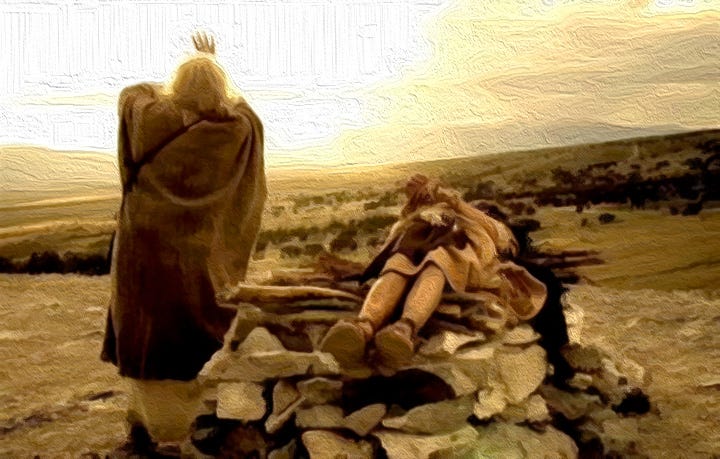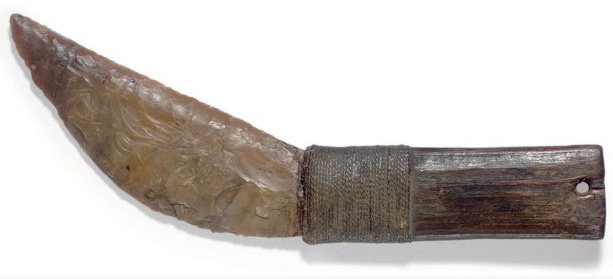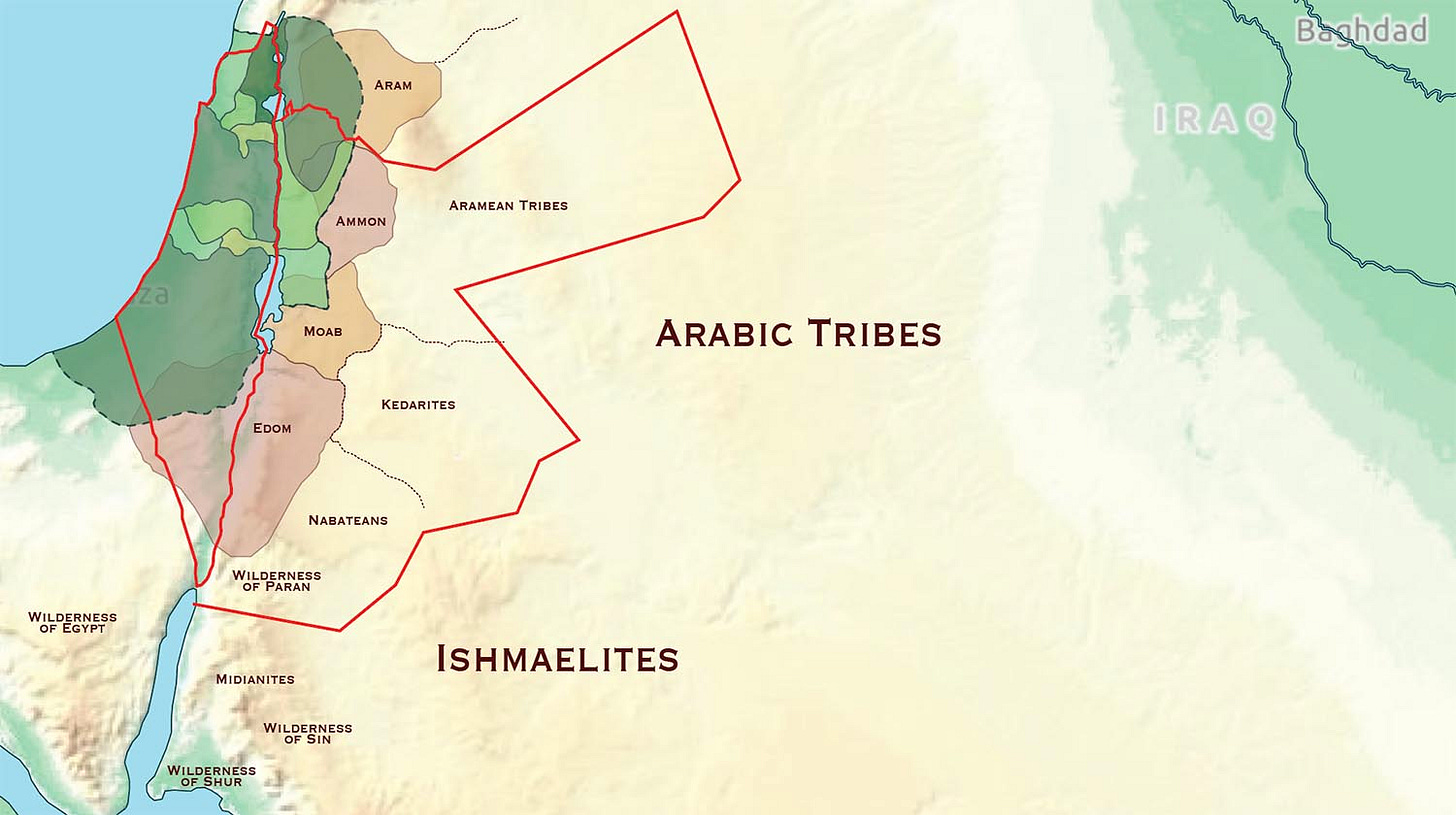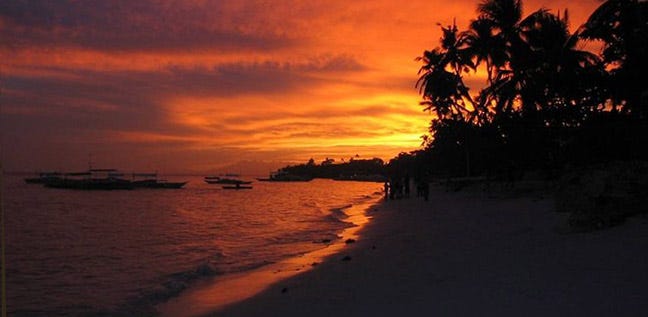This was meant to be the last part in a series, but the Lord seems to have had other plans.
November 9, 2023
Good morning, fellow humans. As events unfold in the Middle East there is an earthquake in the blogosphere. We can see a whirlwind of coverage by the usual media, and a torrent of information targeting us through the social media fire hose. Regardless of your stance or your bias, Reader, my hope is that this essay finds you like a gentle whisper. When Elijah finally poked his head out of hiding, God’s question was “What are you doing here, Elijah?”
So what are you doing here, friend? Whether you are a Christian, Jew, or Muslim there is a central historical figure and a central place where God set in motion events that rock the world today. If you are none of those, then this piece may still be helpful to you. My attempt here will be exploring the roots to illuminate the present, when we consider monotheistic religions today and the escalating drama in the Middle East and Levant. It is more challenging to shine a light into the corners and understand why we believe as we do than it is to follow rote doctrine or traditions. Let us begin by visiting the infamous scene:
Year: circa 2000, BC
Location: Mt. Moriah, Canaan
A 115 year-old man named Abraham is building his fourth altar to God, who has commanded him to sacrifice his son Isaac. Abraham has not questioned it, because he has been following God since the age of 75. He built his first altar not far from here in fact, upon arriving in the land of Canaan -- promised him by God. Abraham has been sacrificing animals on altars ever since. But never children; at least, not until now. This sets him apart from the other inhabitants of the land.
The site is stony and high, boasting nothing except scattered scrub brush. Yet this is where the Lord God led him, to this very spot. Wood had to be brought for the fire, which Isaac carried as they both struggled to get here. The boy had asked Abraham ‘where is the lamb for the burnt offering?’, and as a parent often responds when struggling to explain, he simply answered ‘God will provide, son.’
As he is stacking stones, Abraham may be reflecting on the journey that brought him to this mountain. His own father Terah had been a craftsman of idols when they lived in Ur. His 5x-great-grandfather Peleg had only died when Abram - as he was known then - was in his 40’s, and he well remembers all the stories of old when people had supposedly spoken only one language. It was hard to imagine a time when there were no ziggurats, or great kings doing battle. Rumor held that the old man in the mountain ‘Lord Arrata’ himself had only just died about the time Abram was born. But if he really was Noah, that seemed an impossibly long time to live.
In Shechem, God had first revealed to Abraham that this was the land his offspring would inherit; a wild place far from civilization and full of Amorites, Jebusites, even six-fingered Rephaites, huge and terrifying. But it was under the giant oaks of Mamre, after spending time in Egypt and finally separating his herds from his nephew Lot, that God had promised to make Abraham’s offspring as the dust of the earth. He may be thinking about the utter destruction of those cities in the plain, and how Lot always seemed to need a rescue from trouble.
As he is preparing the wood, Abraham could be remembering breaking bread with Melchizedek of Salem, the priest of God. Melchizedek worshipped the same YHWH, and Abraham was glad to honor him with tithe portions. Shortly afterward he encountered God in a vision, who again promised him offspring as numerous as the stars. He smiles, thinking how he had felt being 85 and childless. But God was insistent, filling his mind with future details about 400 years of captivity, and then four more generations for his descendants to return to Canaan while the sins of the Amorites came to full measure. A year later, he became the father of Ishmael by Sarah’s maid Hagar. But the son of a slave was not an heir.
As he binds Isaac’s hands and feet, his true son and heir, Abraham may have thought about the boy’s miraculous birth: God had next appeared when ‘Abram’ was 99, making a covenant and giving him the name Abraham, confirming he would be the father of many nations. He completed the covenant by circumcising himself and his household, even young Ishmael. A blood oath, of sorts, and a physical sign that separated his people further from the Canaanites. It seemed impossible at the time, but his son Isaac was born within a year. Sarah had been at least 90, and he was the joy of her life. Now he would be gone.
A tear comes to his eye as Abraham may be considering Abel, Adam’s second son who offered God his best, the first of his flock. Isaac’s eyes watch him, as if asking again ‘where is the lamb for the sacrifice, Father?’ when he already knows the answer. But God is indeed a worker of miracles, and the task must be completed. Looking up to Heaven, he pulls his knife out of its sheath, knowing that nothing is impossible, and trusting that God can grant him another son at any time. Abraham draws back the blade. Isaac shuts his eyes.
“Abraham! Abraham!”, calls an urgent voice from Heaven, at the last possible moment.
Abraham freezes, his hand trembling in mid-air, and confusion flooding through his body. “I’m here!” he cries out, not seeing anyone.
“Do not lay a hand on the boy,” commands the Angel. “Do not do anything to him. Now I know that you fear God, because you have not withheld from me your son, your only son.” This angel was not merely an angel, but a manifestation of God himself.
Relief washes over Abraham. Realizing he is still holding the knife, he cuts the ropes to free his son. Then he notices a young ram nearby, caught in the brambles. With tears of joy, he captures the animal by its horns, kills it, and places it on the altar instead of Isaac. The fire burns and the two share an embrace, thanking God for his provision, and taking in the aroma of an offering which has so often symbolized the obedience and the closeness they feel to God. Abraham, truly thankful, names this spot YHWH-yireh, meaning The Lord Will Provide.
The Angel of the Lord calls down a second time, confirming to Abraham that because of his faithfulness in not withholding what was most precious to him, Isaac, that he will surely make good on the previous promises. The Angel adds, “Because you have obeyed me your descendants will take possession of the cities of their enemies, and through their offspring all nations on earth will be blessed.”
Abraham has no doubt that God’s will must be accomplished, even without knowing how. The Lord Will Provide. This is another of God’s gifts, both miracle and mystery; Abraham is growing accustomed to them. But Isaac comes down that mountain with new confirmation that God has a plan for him, not just the vague sayings of an aging man. Each of them are in awe of God Most High, wondering what it all means and how it will eventually be accomplished. Abraham thinks about Sarah waiting for them at home, and perhaps wonders what he will tell her about today.
They head off together for Beersheba.
As pivotal events in history go, few have the significance of that day on Mt. Moriah. Ishmael would father 12 tribes of Ishmaelites. Isaac fathered Esau and Jacob, who God would rename Israel. Esau’s descendants became the Edomites, and Israel’s 12 tribes need no introduction. After Sarah’s death Abraham took another wife, Keturah, who would give him six more sons and many clans from those sons who became the Bedouins.
As we will see on the map below, Abraham’s descendants not only occupied the Levant where Israel and Jordan are today, but also spread Southward and Eastward over the centuries to occupy most of what would become Saudi Arabia. Here is a rough outline:
Arabians
Descendants of Esau, Ishmael, and Keturah’s sons comprise what we can loosely call the Arab peoples, historically. Yes there were Mesopotamians and Egyptians mixed in there, and yes it is hard to pin down nomadic tribes without borders, but they dwelt in and among those desert regions that were outside the Levant. Although it will be unpopular to say so, geographically this is directly related to birthright among Abraham’s offspring. For example, by trading his birthright to Jacob, Esau did not inherit Isaac’s lands and had to settle to the south. Ishmael, by being Hagar’s son rather than Sarah’s, had to be sent away to the south as well. In those days, in that place, the birthright meant everything.
History tells us that the nomadic Arab tribes did not have a unified religious or governing body until the advent of Islam, some 2500 years later. They were traders, mostly living in tents and desert strongholds, and often adopting the gods and religious practices of those they came into contact with over the centuries. This will become extremely important to understand when we get to the Roots of Islam in a future essay, because there was one religious practice that was the exception: Hanīfiyyah. It is connected to the pure monotheism of Abraham, and rejecting polytheism.
The whole Arabian Peninsula has a very rich settlement history, including apparently a grassier landscape than exists today. Abrahamic tribes remained the large majority, but by the time of the Jewish exiles there were tribes of Jewish Arabs in what is now Yemen, then later Christian Arabs during the first centuries AD. There was also a Zoroastrian influence in the East. All of these would contribute to the tapestry that was present during the eventual unification under Islam.
Israelites
The 12 tribes of Israel are descended through Isaac’s son Jacob, renamed Israel by God upon the renewal of the Abrahamic covenant. These tribes would indeed endure Egyptian captivity that God had foretold to Abraham, and wandering in the wilderness under Moses; until finally entering the land of Canaan themselves with Joshua in command. Since the priestly tribe, Levi, could not own land, Joseph’s inheritance was split to two half-tribes through his sons Ephraim and Manasseh. Thus the physical territories still numbered 12, but the trick would be actually claiming them and taking possession. Not so easy when you think of the sheer size of some Canaanites like the Rephaites already mentioned, or some Philistines like Goliath.
‘Salem’ in Abraham’s time, or Urusalim as known by the Egyptians, was named Jebus by the time Israel came to claim it. It took some 400 years for them to really subdue the Promised Land, and it was David who finally took possession of the city of his enemy, which we call Jerusalem. His son King Solomon would go on to build the first Temple on the nearby hilltop, supposedly placing the Ark of the Covenant on the exact spot of Abraham’s former altar. This of course is the controversy surrounding the Dome of the Rock, which covers that spot today, situated on roughly the same temple platform that Solomon built, and that King Herod later enlarged. Who it ‘rightfully’ belongs to is the hot topic, but matters little for this essay.
Unlike the Arabian tribes, the Israelites did have a unified religious and governing system. At least for a period of time they were a nation, with wide ranging power and influence. But Israel’s possession of the Promised Land was never truly completed. As Bible readers know, when God was with Israel she could not be stopped. But when she drifted away into idolatry, mixing of cultures, lusting after earthly things -- those were the times God removed his hand of protection, and gave her over to her enemies. The books of the Prophets outline what would later happen to Israel, i.e. destruction by the Babylonians, Persians, and Romans as punishment by God. But the Prophets also outline Israel’s future restoration and glorification, hence the claim by both sides over the same territory today.
Palestine
But wait, Reader, you may be thinking: Arabs were not Canaanites. Aha, we’re getting to the meat of it now. If the Arabian tribes from Abraham filled out the southern lands and the Israelites failed to wipe out the Canaanites...then who are Palestinians? The answer is “needs more information.” If we are talking pagan Canaanites, with their polytheism and child sacrifice, then the answer is no. No more giants walking around, no one worshipping Ba’al that I know of. Those cultures no longer exist, just like ancient Judaism has been supplanted by Zionist Judaism.
Palestine was a region first identified by the Greeks. Etymologically related to Philistia, It has become useless to try connecting the word to the Philistines, whose territory was limited to the coast. As a provincial term it was part of Syria and by the time of the Ottomans included all the land we call the Levant, i.e. the green / pink / orange there on the map. By the time of the British Balfour Declaration and British Mandate, Palestine included all of the Transjordan, enlarging it to the red outlines shown. Yet it was still just a region with no self-governance.
Interestingly, the Kingdom of Jordan today is 35-40% Christian, and seems entirely descended from Abraham and his relations. As noted, ancient Edom were Esau’s descendants. Moab and Ammon were the lands of Lot’s sons, through the incestuous encounter with his two daughters in the cave (ahem). Nabateans, Kedarites, and so forth were all descended from Ishmael and/or Keturah’s sons. Palestine is a misnomer in terms of historic peoples, and I would argue it remains a political pressure point on purpose.
Abraham’s Legacy
Blood haplogroups show us the Levant today still has over 50% ancestral heritage, whether ancient Hebrew, Philistine, Aramean, or what have you. This seems remarkable when we consider the exiles of the past, the Crusades, and more modern migrations. I propose the explanation can be found in the concept of the Remnant, as described in the Bible.
Both the Babylonian and Persian invasions took most inhabitants into exile as slaves, but left behind a small percentage of unwanted people, who then merged into the conquering society. In other words, the old, the sick, and the lame were left, and those bloodlines are still there. This is why I do not believe there are 10 ‘lost tribes’ of Israelites...because a remnant of all 12 tribes remained. As did the remnant of original Canaanite inhabitants who were mixed in with Israel at the time.
The reason we do not see polytheistic Canaanite culture today is because that remnant lacked the structure of the Judaic system, and was absorbed into two seismic movements that would sweep through the Levant and the Arabian Peninsula successively: Christianity from the first century AD, and Islam from the seventh century. This is an often overlooked part of Abraham’s legacy, i.e. the complete erasure of idol worship, pagan rituals, and child sacrifice in the Levant and the greater Arabian peninsula.
Abrahamic cultures replaced these things with animal sacrifices to God, including the promise of a future perfect sacrifice in the form of Christ, beautifully illustrated at that altar on Mt. Moriah. Mosaic Law refined this further, making animal sacrifice an atonement for sin; again previewing what was to come later at the Cross. Christ, himself a descendant of Abraham, would eventually be the lamb for the sacrifice, even carrying his own wood up the hill like Isaac. It was the event of all history, and its implication for us today is summarized perfectly by the Apostle Paul in Galatians 3:
6 So also Abraham “believed God, and it was credited to him as righteousness.” 7 Understand, then, that those who have faith are children of Abraham. 8 Scripture foresaw that God would justify the Gentiles by faith, and announced the gospel in advance to Abraham: “All nations will be blessed through you.”
28 There is neither Jew nor Gentile, neither slave nor free, nor is there male and female, for you are all one in Christ Jesus. 29 If you belong to Christ, then you are Abraham’s seed, and heirs according to the promise.
30,000 ft. Perspective
I often like to take the long-lens view, Readers, so here is my perspective on Abraham: The Flood was God’s first Great Reset, erasing the wickedness of the days of Noah. Yet it did not take long for ‘gods’, maybe fallen angels, to work their way back into the first societies established by Noah’s sons. Pagan rituals and pantheon gods dominated ancient Sumer from the earliest Ubaid period. As people groups with their newly divided languages pushed outward to Egypt and filled in the Levantine areas, the result was depraved wickedness such as in the cities of Sodom and Gomorrah. Again. One man willing to follow God, Abraham, would become his chosen instrument of change. The stage was set 4,000 years ago; truly ancient to comprehend.
Abraham, barely out of the stone age, still using a flint knife and carrying fire in a tube, walked in Gods ways and followed his commands. God honored his promise to Abraham, whose offspring eventually filled most of the Levant and Arabian peninsula with monotheistic culture -- spawning first Judaism, then Christianity, and then Islam. In doing so the polytheistic cultures were erased, clearing the way for God’s plan of redemption to unfold. This is key. A seed of Abraham, Christ, would become the means by which not only his own descendants could be redeemed, but the entire world. It is quite elegant. All the nations on Earth will be blessed, said the Angel.
Application
The world has gone mad as it seethes over developments in Israel, because it doesn’t know what it is waiting for. But spend enough time in the scriptures, and you will know. Israel has not accepted Christ as Messiah because God has hidden the truth from them, hardened their hearts until the appointed time according to Romans 11. He has made salvation available to the Gentiles (non-Jews), in part to make Israel jealous, and will not open her eyes to the Messiah until the full number of Gentiles has come in. I don’t know what that number is or how long it will take, but it is the reason behind Jesus’ great commission, i.e. to spread the Gospel to the ends of the earth. We are not far off from that, but only God knows the full number and the timing.
Ezekiel 36 describes how God will eventually remove Israel’s heart of stone and give her a new heart and a new spirit. Israel will be delivered and glorified once again, and he will make a new everlasting covenant with her. Maybe that is not what some of you want to hear; I don’t know where your heart is. But I do sense a kind of unhinged rage out there, which is why I hope this essay finds you at peace within yourself and the world, Readers.
If your thoughts on Israel trend toward hatred, or the Khazarian mafia or Jewish bankers then I encourage you to take a deep breath and really delve into the prophecies and the biblical view of this. If you are overwhelmed with the injustices of Zionism, then consider how it nevertheless accomplished the work of returning Israel to the land God promised; a land which has even experienced a miraculous transformation since 1948. Just as Ezekiel describes. God’s use of bad actors in history to accomplish his own plans is actually quite common. Ask yourself if the Crown, or DC, or the Vatican are good actors, and then consider the information war we are in.
It can be difficult to wade through all the opinions and feel accurately informed about the world around us, but it is just possible that God knows what he is doing. Trust Him, that is my Visayas Outpost advice of the day. The long view says that we are on a rollercoaster leading up to the emergence of the Beast System and the Antichrist. Will Israel be further punished by God? Are the rest of Abraham’s offspring to be cast into hell, or will Islam undergo an awakening? What about false theology and false teachers throughout the Christian world? No one has all the answers, but you can still be secure in your salvation by putting your faith in Christ, friends.
Final Thoughts
Christian, have patience, and recognize that we are the in-grafted branches to this faith. We should not be arrogant, but humble. I suspect as archeological findings continue to be unveiled that we will see many new people come to Christ. Some of the recent discoveries in Saudi Arabia are earth-shattering, so stay tuned as we continue to discuss the branches of monotheism next. I plan to cover Judaism, Apostolic Christianity, Islam, Catholicism, and Protestantism -- God willing. Hopefully it will be eye-opening, even challenging, otherwise what is the point of researching these things?
My goal with Visayas Outpost is not to repeat the opinions of others, but to bring clarity or new insights with the words I write. I strive to treat these topics fairly and do appreciate your feedback, Readers. Deep and complex issues deserve scrutiny, and your decisions about them may matter greatly. I hope you have enjoyed this look at Abraham and the role he still plays in the world today. Repost if you think it is important, all content is free.
Peace be upon you in Christ, friends, from across the waves,
Visayas Outpost







Excellent essay! I put additional comments on the post in The Burning Platform. The negative comments and thumbs down, as expected, are coming in.
Excellent. Thank you.